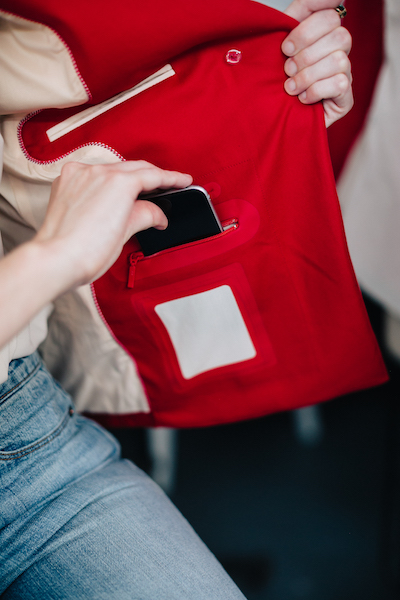At eight years old, Eleanor Turner already had her “lifelong dream” figured out. During a road trip up the East Coast with her grandparents, the Lynchburg, Virginia native had a blast drawing the people she saw, focusing mostly on what they were wearing.
After the trip ended, her curiosity about clothing continued: she used leftover fabric from her mother’s swatch library when playing with her Barbie dolls.
“Hey, you can actually do that for a living,” someone told her. “You can be a fashion designer.”
“I can get paid to do this? Cool!” thought Turner.

“In my eight-year-old mind, I was like, ‘Yes, that’s what I want to do,’” says Turner, now 30. “And I followed it through.”
After receiving a degree in fashion design from the Savannah College of Art and Design, Turner moved to New York, where she put her design chops to the test at “very fast-paced” and “super inspiring” brands like J.Crew, Tory Burch, Tommy Hilfiger, and Isaac Mizrahi.
And then in 2014, Sali Christeson entered the picture.
“She’ll always say it was destiny or fate,” says Turner of how Christeson claims they met. “We met through a mutual friend, and that mutual friend always gets mad when she says it.”
Given that Christeson—with a background in business administration—is based in San Francisco, it was over the phone that she first told Turner about wanting to start a women’s work apparel company.
“Sali will always say that women are judged by what they wear, and that can totally affect your career trajectory,” Turner explains.
A year later, this issue continued to trouble the duo. So while Christeson was in New York for a few meetings, she and Turner decided to finally meet in person.

“I saw an opportunity to do something about it, and to actually help women, and solve problems with clothes, as opposed to just designing another garment,” says Turner. “I saw an opportunity to really innovate. And not just with clothes either—with branding as well, to connect to the millennial consumer that really hasn’t been spoken to. And gosh, how can you turn that down?”
Founded in 2015, Argent is the go-to guide for any woman who’s overwhelmed or confused by how to dress appropriately and confidently for work. Argent has its own line of stylish blazers, tops, pants, dresses, and jumpsuits, most of them made in Manhattan. The website breaks down dress codes into four styles, from casual to formal—depending on your profession—using Pinterest boards as a helpful visual tool.
“That was one of the biggest things that we noticed in our early research: sales people don’t ask you what you do,” says Turner. “Most people don’t need a suit anymore. Some people do, but the landscape of working environments is changing more than ever. If you’re in tech and you can wear denim, then hey—we’ll help you style it back to your favorite pair of jeans. If you’re a lawyer and you have to wear a suit every day, we’ll help you put that together too.”

While Turner focuses on designing the garments in New York, Christeson runs the business from San Francisco, where a showroom will be soon be set up at WeWork California St.
“And that’s actually why I think our partnership is so special,” says Turner. “Because we cover very different areas. In fact, we took a personality test that showed we are exact opposites. The woman who administered the test gave us a little breakdown…It was funny because she just wrote at the top of the email, ‘Wow, if you guys have gotten this far, this is a match made in heaven.’”
Though Argent is all about focusing on the needs of the modern working woman, inspiration for the brand and its name harkens back to important men in the founders’ lives.
Christeson’s great grandfather had a lumber company in South Carolina called Argent Mills.
Since “argent” stands for “silver” or “money” in French, says Turner, “We felt like it was a really strong, interesting name that parallels, ‘Hey, you’re a working woman. You’re making money.’ Also, we just loved the tie of short, easy to pronounce, top of the alphabet. If we’re on any kind of list, we’re usually at the top, so it’s kind of awesome.”

Turner’s great grandfather—an entrepreneur in the textile industry—was married to Lucile Barrow Turner, a well-known gospel singer who regularly performed on NBC.
“Because she was a woman before her time,” says Turner, “my great grandfather was credited with hiring more women than any of the other pre-WWII factories in the South.”
Looking back on her family history of resilient women and supportive men, Turner says, “I was raised to believe I could do anything as a female.”
Photos: Lauren Kallen




